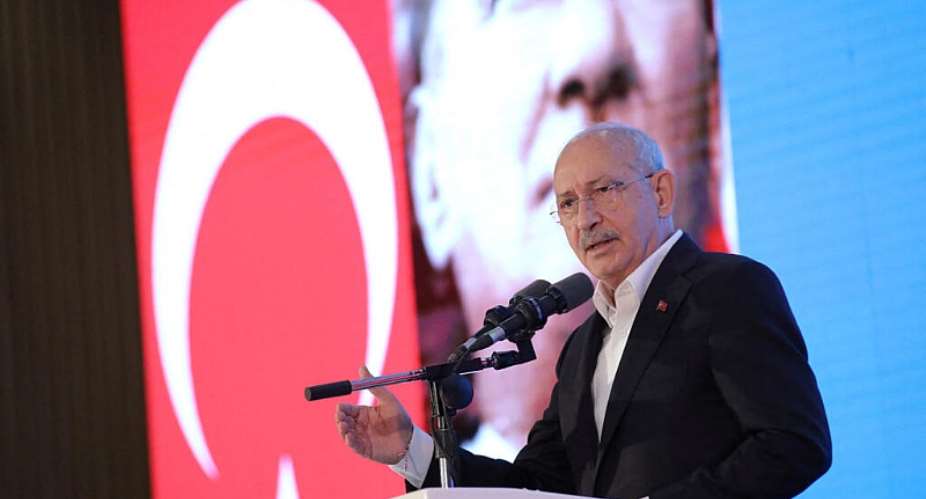Turkish President Recep Tayyip Erdogan is struggling in many opinion polls ahead of the May elections. Challenger Kemal Kilicdaroglu has promised to mend strained ties with Turkey's Western allies, a move which could be bad news for Moscow and might pose a dilemma for the European Union.
With Turkey's economy in crisis, Kilicdaroglu is ahead of Erdogan in many polls. Kilicdaroglu has promised economic reform and a diplomatic reset with Turkey's Western allies.
"Some of the relations, such as with the United States, with Nato, with the EU, are going to come back, predicts political scientist Zeynep Alemdar of Istanbul's Okan University. "Since a Western orientation is no doubt going to be one of the first priorities of a new administration."
Erdogan's deepening ties with his Russian counterpart, Vladimir Putin, involving energy deals and purchases of Russian weapons, are straining relations with some of Turkey's Western allies.
Turkey, a member of Nato, is blocking Sweden's membership bid. However, Zaur Gasimov, a professor of history and expert on Russia at Bonn University, says that Moscow sees Erdogan's foreign policy as an asset.
"It is not perceived by Moscow as pro-Russian. It's perceived as pro-Turkish and tough pro-Turkish. But it is also not perceived as pro-Western. I guess that is the main aspect that fits into the agenda in Moscow," said Gasimov.
Energy, tourism and support in Syria
Turkey depends heavily on Russian energy, tourism, and cooperation in Syria. So untangling ties with Moscow will not be easy.
"It would be tough to balance relations with Russia," said Alemdar. "No matter what, given the economic interdependency between the two countries.
"So, one would hope for a renewed and better relationship with the EU in terms of the green transition as well, for example, so that the Russia relations can also be rebalanced again," added Alemdar.
Turkey's poor human rights record caused its EU membership bid to be frozen long ago. Relations are now more transactional, for example, Ankara's EU deal to host Syrian migrants in exchange for cash.
Kilicdaroglu vows a new constitution based on rights that will allow Turkey's EU bid to advance. But Alemdar warns such a reset poses the EU a dilemma.
"I think the relationships with the EU would definitely be much better from Turkey's side. But the ball is in the EU's court because, with the migration deal and its domestic effects in Turkey, I think it would be would be necessary for the EU to devise new ways of interacting with the Turkish government as well," said Alemdar.
Some Europeans happy to see Erdogan go
Given that several EU members are opposed to Turkey's bid, some observers suggest that some European figures may welcome a change in Turkish leadership.
"This Europe is not the Europe of a decade or two decades ago when Erdogan first came to power, and Turkey's accession talks started. Europe no longer wants enlargement, observes Asli Aydintasbas of the Washington-based think tank, the Brookings Institution
"The EU is no longer willing to see Turkey as a member of the club. And as such, Erdogan is a transactional partner, a person they can engage in a given situation, but a person whom they know is never going to be part of the European club works for their long-term interests.
"An opposition victory would smooth out the wrinkles in the relationship, but it would force Europeans to think hard about Turkey and whether or not they see Turkey as part of the club. Neither Washington nor Europe is prepared for a post-Erdogan world," concluded Aydintasbas.
Analysts point out that Turkey's Western allies were surprised when Erdogan's AKP Party stormed to power in 2002. A Kilicdaroglu win, they say, could again see diplomats scrambling.





 We’ll no longer tolerate your empty, unwarranted attacks – TUC blasts Prof Adei
We’ll no longer tolerate your empty, unwarranted attacks – TUC blasts Prof Adei
 Bawumia donates GHc200,000 to support Madina fire victims
Bawumia donates GHc200,000 to support Madina fire victims
 IMF to disburse US$360million third tranche to Ghana without creditors MoU
IMF to disburse US$360million third tranche to Ghana without creditors MoU
 Truck owner share insights into train collision incident
Truck owner share insights into train collision incident
 Paramount chief of Bassare Traditional Area passes on
Paramount chief of Bassare Traditional Area passes on
 Two teachers in court over alleged illegal possession of BECE papers
Two teachers in court over alleged illegal possession of BECE papers
 Sunyani: Victim allegedly shot by traditional warriors appeals for justice
Sunyani: Victim allegedly shot by traditional warriors appeals for justice
 Mahama vows to scrap teacher licensure exams, review Free SHS policy
Mahama vows to scrap teacher licensure exams, review Free SHS policy
 Government will replace burnt Madina shops with a new three-story, 120-store fac...
Government will replace burnt Madina shops with a new three-story, 120-store fac...
